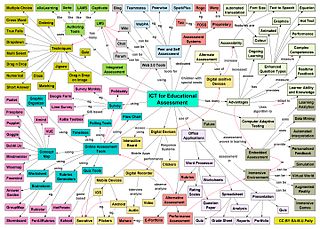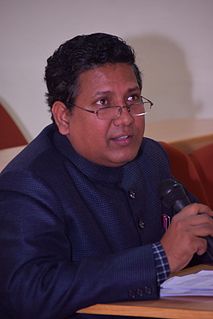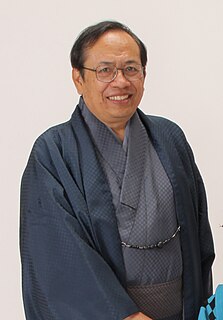Chin Saik Yoon is the head of Southbound, an academic publishing house based in Penang, Malaysia. Chin founded Southbound in 1990, "to provide a voice for researchers and practitioners" in both the South and the North concerning issues related to development. Southbound has since specialised in titles relating to development communication, and ICT4D (Information and Communication Technologies for Development).
Chin is also the chief editor of the Digital Review of Asia-Pacific, a bi-annual publication that looks at how ICT (information and communication technology) is deployed in support of socio-economic development of the economies in the Asia-Pacific region. He is also a practitioner of participatory development communication, which aims to facilitate bottom-up processes that put people in charge of their own development.
Telecommunications in Mongolia face unique challenges. As the least densely populated country in the world, with a significant portion of the population living a nomadic lifestyle, it has been difficult for many traditional information and communication technology (ICT) companies to make headway into Mongolian society. With almost half the population clustered in the capital of Ulaanbaatar, most landline technologies are deployed there. Wireless technologies have had greater success in rural areas.

The digital divide refers to the gap between those who benefit from the Digital Age and those who don't. People without access to the Internet and other information and communication technologies are put at a disadvantage, as they are unable or less able to obtain digital information, shop online, participate democratically, or learn and offer skills. This resulted in programs to give computers and related services to people without access.

The United Nations Information and Communication Technologies Task Force was a multi-stakeholder initiative associated with the United Nations which is "intended to lend a truly global dimension to the multitude of efforts to bridge the global digital divide, foster digital opportunity and thus firmly put ICT at the service of development for all".
Community informatics (CI) is an interdisciplinary field that is concerned with using information and communication technology (ICT) to empower members of communities and support their social, cultural, and economic development. Community informatics may contribute to enhancing democracy, supporting the development of social capital, and building well connected communities; moreover, it is probable that such similar actions may let people experience new positive social change. In community informatics, there are several considerations which are the social context, shared values, distinct processes that are taken by members in a community, and social and technical systems. It is formally located as an academic discipline within a variety of academic faculties including information science, information systems, computer science, planning, development studies, and library science among others and draws on insights on community development from a range of backgrounds and disciplines. It is an interdisciplinary approach interested in using ICTs for different forms of community action, as distinct from pure academic study about ICT effects.

Information and communications technology (ICT) is an extensional term for information technology (IT) that stresses the role of unified communications and the integration of telecommunications and computers, as well as necessary enterprise software, middleware, storage and audiovisual, that enable users to access, store, transmit, understand and manipulate information.

A telecentre is a public place where people can access computers, the Internet, and other digital technologies that enable them to gather information, create, learn, and communicate with others while they develop essential digital skills. Telecentres exist in almost every country, although they sometimes go by a different names including public internet access center (PIAP), village knowledge center, infocenter, Telecottage, Electronic Village Hall, community technology center (CTC), community multimedia center (CMC), multipurpose community telecentre (MCT), Common/Citizen Service Centre (CSC) and school-based telecentre. While each telecentre is different, their common focus is on the use of digital technologies to support community, economic, educational, and social development—reducing isolation, bridging the digital divide, promoting health issues, creating economic opportunities, and reaching out to youth for example.
Technological literacy is the ability to use, manage, understand, and assess technology. Technological literacy is related to digital literacy in that when an individual is proficient in using computers and other digital devices to access the Internet, digital literacy gives them the ability to use the Internet to discover, review, evaluate, create, and use information via various digital platforms, such as web browsers, databases, online journals, magazines, newspapers, blogs, and social media sites.
Asia-Pacific Development Information Programme was an initiative of UNDP and "aims to promote the development and application of information and communication technologies for sustainable human development". Its sphere of work was the Asia-Pacific region. APDIP was based within the UN premises in Kuala Lumpur, Malaysia.
In 2003 and following years, initiatives were instituted to improve internet access for people with disabilities in the Philippines. These measures were inspired by the UNESCAP "Asia-Pacific Decade for Disabled Persons" (1993–2002). Key organizations included the government body National Council for the Welfare of Disabled Persons (Philippines) and the private sector body Philippine Web Accessibility Group (PWAG). The "Disabled Friendly Website Awards" were launched to encourage web designers to incorporate universal access. Since 2009 unhampered access to Information and Communications Technology (ICT) has been in the second National Human Rights Action Plan of the Philippine government.
Information and communication technology in agriculture, also known as e-agriculture, focuses on the enhancement of agricultural and rural development through improved information and communication processes. More specifically, e-agriculture involves the conceptualization, design, development, evaluation and application of innovative ways to use information and communication technologies (ICTs) in the rural domain, with a primary focus on agriculture. ICT includes devices, networks, mobiles, services and applications; these range from innovative Internet-era technologies and sensors to other pre-existing aids such as fixed telephones, televisions, radios and satellites. Provisions of standards, norms, methodologies, and tools as well as development of individual and institutional capacities, and policy support are all key components of e-agriculture.
The African Telecommunications Union (ATU) is an organization in Africa that combines countries and mobile telecommunications providers in an attempt to dramatically increase development of the continent's information and communication technology (ICT) infrastructure.

K M Baharul Islam is presently the Chairperson of Centre of Excellence in Public Policy and Government at Indian Institute of Management Kashipur. He served as the Dean (Academics) during 2019-2021 at the same institute. He was elected as a Fellow of the Royal Asiatic Society of Great Britain and Ireland on 18 March 2020.

The Asia-Pacific Telecentre Network (APTN) is a collaborative initiative of the United Nations Economic and Social Commission for Asia and the Pacific (UN-ESCAP) and telecentre.org. The APTN Secretariat is hosted at ICT Agency of Sri Lanka (ICTA). APTN is dedicated to promote innovation and knowledge sharing amongst telecentres in the Asia-Pacific region where telecentres are growing exponentially each year. APTN is working towards creating a platform of networks of telecentres, to share experiences on issues of their interest and to cooperate on the development of solutions for common problems of the telecentres themselves in order to empower poor and disadvantaged communities with Information and Communication Technology (ICT) in the Asia Pacific Region. In other words, APTN will serve as the focal network or the knowledge hub for communication and information technology in the Asia Pacific region.
Nalaka Gunawardene trained as a science writer, he has worked as a journalist, broadcaster and development communicator since 1987.
Feni Computer Institute is the first and only ICT based polytechnic institute for Diploma in Engineering courses in Bangladesh. It is situated in Feni Sadar Upazila of Feni City. Founded in 2003, It is directed under Directorate of Technical Education. Every year, around 300 students get accepted to their Diploma in Engineering programs to study about Information Technology. FCI is a member of Asia-Pac ific Economic Cooperation (APEC).

The University of AMIKOM Yogyakarta is a private IT college in Yogyakarta, Indonesia. This college was established on December 29, 1992, under the auspices of the Yogyakarta AMIKOM Foundation. Has 2 diploma programs, 13 undergraduate programs, and 1 postgraduate program. All programs are accredited. The university concentrates on efforts to become the world's leading university in the field of the creative economy based on entrepreneurship. It has more than 3,000 new students every year.
The United Nations Asian and Pacific Training Centre for Information and Communication Technology for Development (UN-APCICT) aims to improve, for the region of Asia and Pacific, information and communications technology (ICT) knowledge for long-term economic growth and sustainable development of the region. Opened in 2006, and located in Songdo Techno Park in Incheon, Republic of Korea, the Centre is Asia's first training centre for Information Communication Technology for Development. UN-APCICT is established by the United Nations Economic and Social Commission for Asia and the Pacific (UNESCAP).

Fortunato "Boy" Tanseco de la Peña is a Filipino engineer and professor serving as the Secretary of Science and Technology in the Cabinet of President Rodrigo Duterte. Before he assumed leadership of the Department of Science and Technology (DOST), he was the Undersecretary for Science and Technology Services from 2001 to 2014. Except for his brief retirement from 2014 to 2016, he has been with the department since 1982.

Hary Gunarto is an Indonesian computer engineer and scientist, writer, researcher and professor emeritus at Ritsumeikan Asia Pacific University in Japan who is recognized for his research and major publications ranging from computer network, computer programming/computer simulation and applications of ICT in business and social science. One of his books on information technology presented to help Indonesian-Malay speaking people and to serve the needs for common understanding of new and specific computer terms appeared in most ICT-related information and Internet news in those countries. In the field of factory and manufacturing computer networks his research contributions in particular were in the development and simulation of prioritized system of messages' protocol which were great importance to interrupt and quickly response to any urgent/dangerous messages coming from factory robots or from security measuring devices/sensors. Commonly recognized as Prioritized Token Bus Protocol, its features are crucial not only to Flexible manufacturing system and CIM but also to current technology of smart Internet of Things networks.